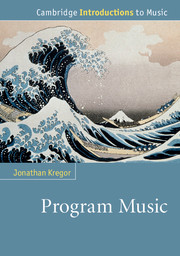Book contents
- Frontmatter
- Contents
- List of Figures
- List of Music examples
- List of Tables
- Acknowledgments
- Note on the text
- Introduction
- Chapter 1 Characters, topics, and the programmatic battlefield
- Chapter 2 Expression, musical painting, and the concert overture
- Chapter 3 Berlioz and Schumann on music and literature
- Chapter 4 Liszt and the symphonic poem
- Chapter 5 The New German School and beyond
- Chapter 6 Excursus: Faust
- Chapter 7 Programmatic paths around the fin de siècle: Mahler and Strauss
- Chapter 8 Programming the nation
- Chapter 9 “Ars Gallica”
- Notes
- Guide to further reading
- Index
Chapter 9 - “Ars Gallica”
Published online by Cambridge University Press: 05 January 2015
- Frontmatter
- Contents
- List of Figures
- List of Music examples
- List of Tables
- Acknowledgments
- Note on the text
- Introduction
- Chapter 1 Characters, topics, and the programmatic battlefield
- Chapter 2 Expression, musical painting, and the concert overture
- Chapter 3 Berlioz and Schumann on music and literature
- Chapter 4 Liszt and the symphonic poem
- Chapter 5 The New German School and beyond
- Chapter 6 Excursus: Faust
- Chapter 7 Programmatic paths around the fin de siècle: Mahler and Strauss
- Chapter 8 Programming the nation
- Chapter 9 “Ars Gallica”
- Notes
- Guide to further reading
- Index
Summary
On 19 July 1870, the Second French Empire, led by Napoleon III, declared war on the Kingdom of Prussia and its German allies. Tensions between the two groups had escalated dramatically in the last ten years, in which France, whose general geographical boundaries had remained unchanged for centuries, grew increasingly wary of Prussia’s aggressive efforts in expanding its borders, particularly following its success against the Austrians in the short-lived Austro-Prussian War of 1866. Despite such omens, Napoleon III thought that a war against the Prussians would be quick and decisive. Yet his defeat and capture at the Battle of Sedan on 1 September 1870 ended his reign, his empire, and any prospects for French military success on the continent for a generation to come. Indeed, while fighting would continue into the next year, the Prussians had won the war at Sedan, which paved the way to German unification on 18 January 1871. For the French, the irony was bitter: Napoleon I’s military campaigns had destroyed the First Reich in 1806; Napoleon III’s miscalculations two generations later helped to create the Second.
Many of France’s musicians had also been concerned by another German threat: the rising tide of interest in Richard Wagner’s operas. Wagner himself had overseen a production of his opera Tannhäuser that flopped at the Paris Opéra in March 1861, and his grand opera Rienzi was featured at the Théâtre-Lyrique in 1869 with only slightly better results. Nevertheless, while these two operas hardly represented Wagner’s more recent fare (especially the music drama Tristan und Isolde), they were enough to plant the seeds of French Wagnerism, the shoots of which threatened to choke almost every new French opera for the remainder of the century. On top of that, Hector Berlioz’s death in 1869 meant that France was without a major composer of orchestral instrumental music.
- Type
- Chapter
- Information
- Program Music , pp. 253 - 280Publisher: Cambridge University PressPrint publication year: 2015

